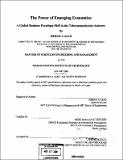The power of emerging economics : a global business paradigm shift in the telecommunication industry
Author(s)
Asad, Rehan A
DownloadFull printable version (24.36Mb)
Other Contributors
System Design and Management Program.
Advisor
Donald R. Lessard.
Terms of use
Metadata
Show full item recordAbstract
When geographers study the world and its features, distance is one of the basic measures they use to describe the patterns they observe. Distance is, however, an elastic concept. Physical distance has played the dominant role in the world's geo-politics, global economy and international trade in last centuries. But in recent times - the impact of physical distance has been diminished and transformed by the effect and advancement of IT & Telecommunication technology. Physical distance has been transformed into virtual distance. Communication from one end of the world to other has become - "Just a click away in a computer or a few finger tips in our cell phone." The focus of this thesis is on two closely related sets of questions. - (I) "How is the state of telecommunication technology in emerging countries changing? How does this technological advancement affect the productivity and international competitiveness of these economies? (II) How does this telecommunication industry development in emerging economies shifting the overall global business paradigm of the telecommunication industry and is this shift permanent or temporary? In this thesis, I will first focus on the background of world telecommunication industry and the market segmentation based on: (I) Key Economic Indicator of Telecom industry (ARPU - Average revenue per user) and (II) Technology. I will then analyze the recent development of world telecommunication industry and conduct case studies on eight global telecom operators (Vodafone, AT&T, Telenor, SingTel, China Mobile, Orascom, America Movil, and Reliance). This analysis will focus on the present situation of global telecom industry, worldwide investment in this sector, market tier & user segments, and buying power of the emerging economies. At this point, I will introduce and examine whether the business models being developed in these emerging economies are likely to impact the global economy. (cont.) To do so, I will apply Porter's competitive advantage of nation analysis and Lessard's Globalization RAT's (Relevant, Appropriable & Transferable) test. Finally, I will conclude my research by illustrating - the evolving global telecom user triangle model and highlight a few key issues for global telecom operators to consider for their future business growth and sustainability.
Description
Thesis (S.M.)--Massachusetts Institute of Technology, System Design and Management Program, 2008. Includes bibliographical references (leaves 80-81).
Date issued
2008Department
System Design and Management Program.Publisher
Massachusetts Institute of Technology
Keywords
System Design and Management Program.